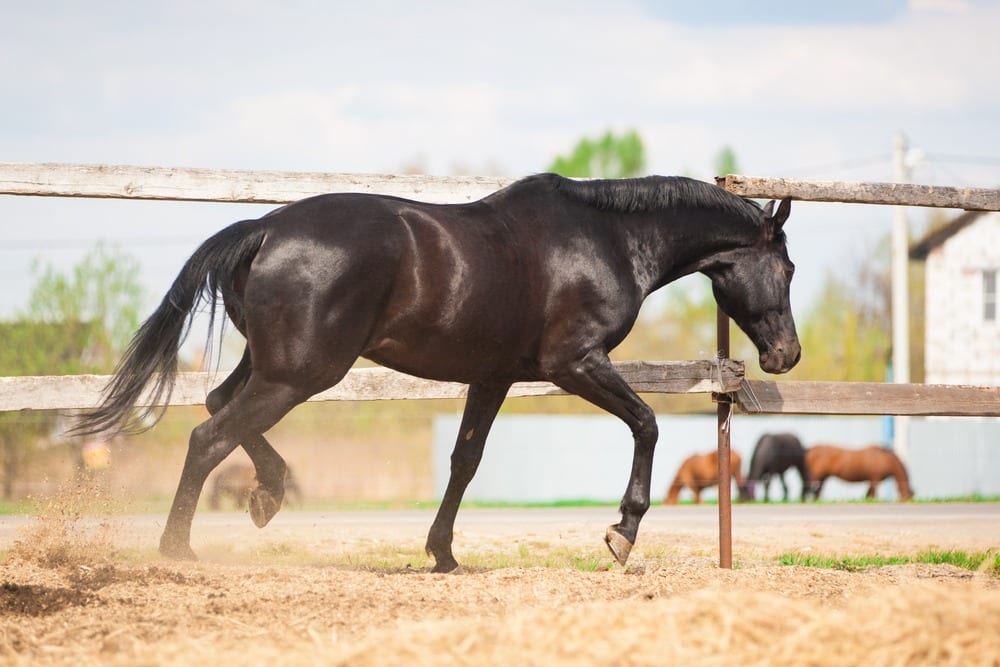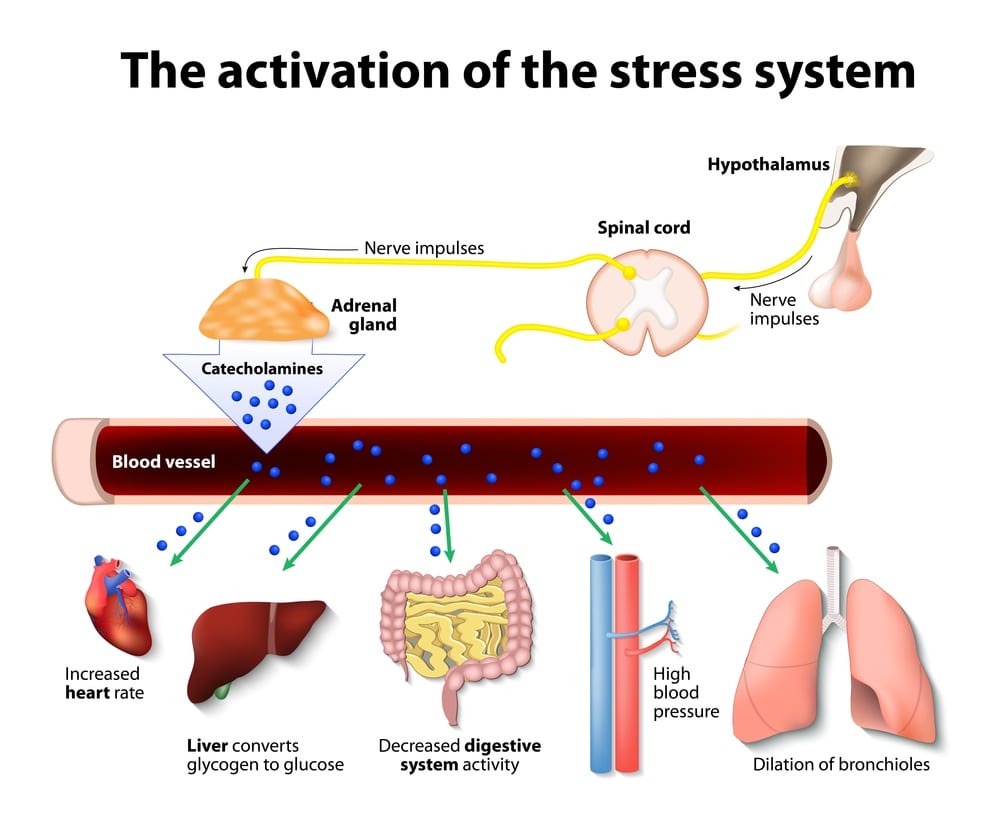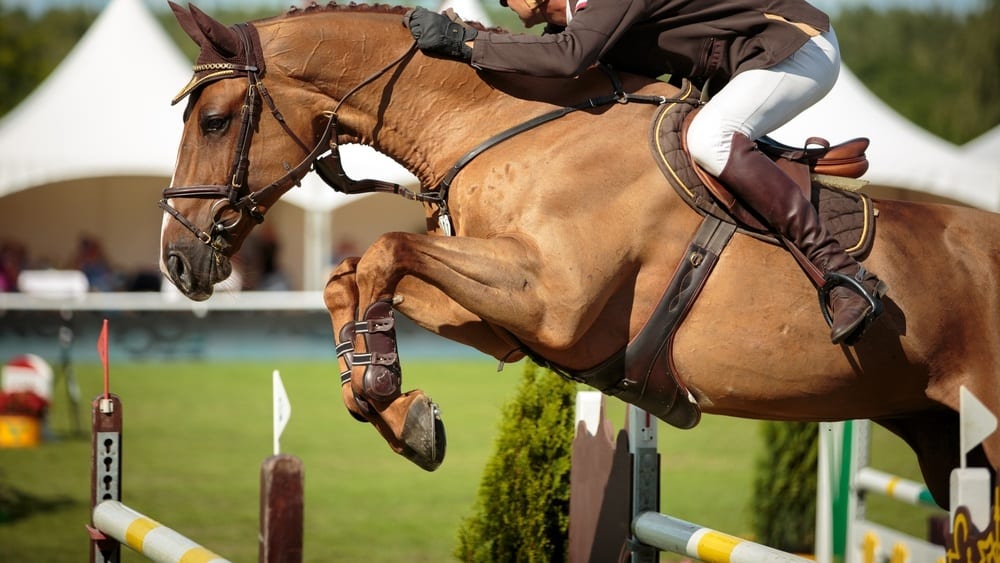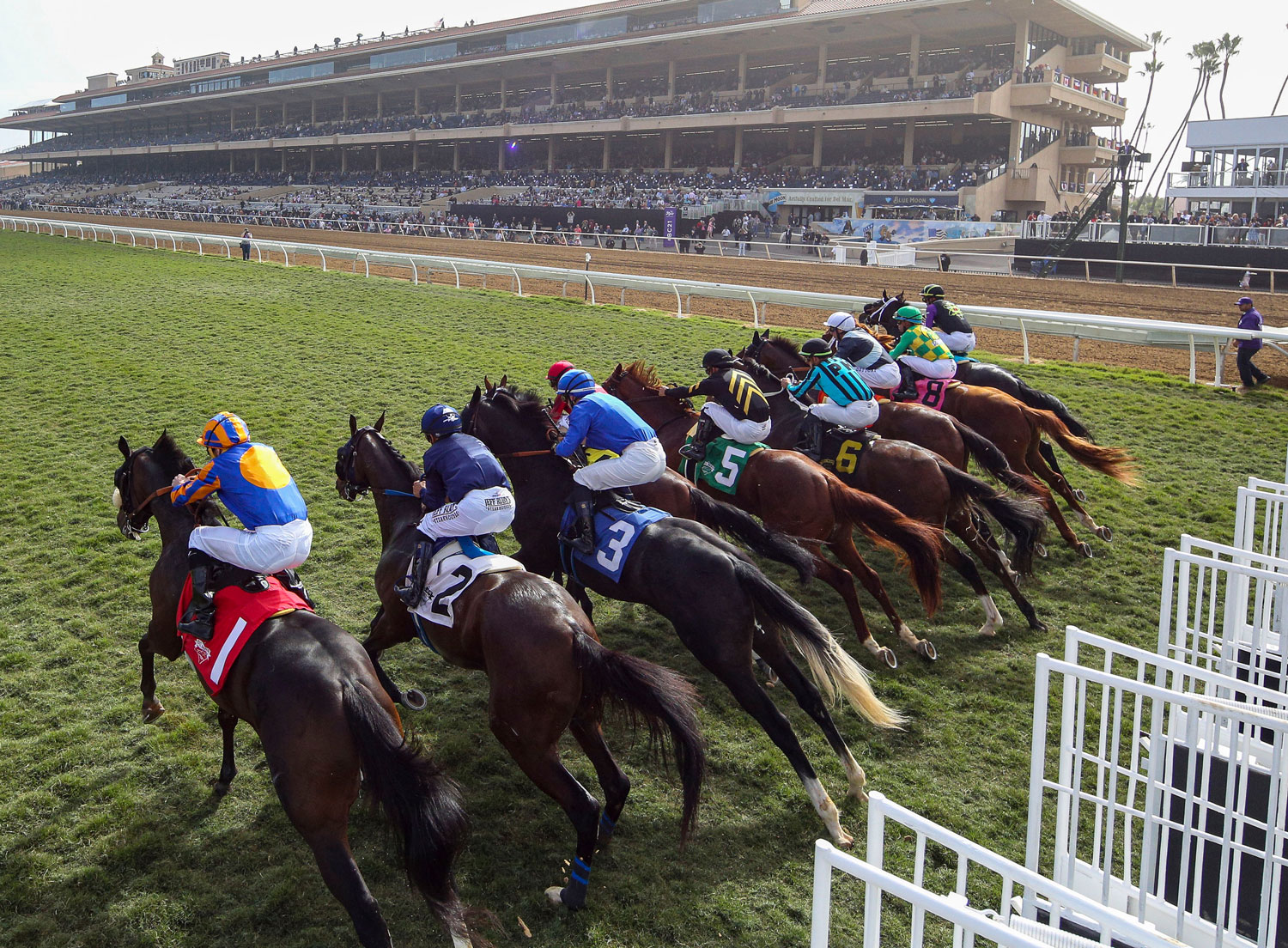We’ve all seen horses that we would label easily “stressed out.” We see them sweating when it’s not hot or they haven’t exerted themselves, behaving aggressively, or jigging and whirling around their handlers. Sometimes we see abrupt changes in behavior after a move to a new barn or when traveling to a new place.
On the other hand, we tend to assume that horses that don’t display these overt signs of anxiety are relaxed and comfortable.
Additionally, many think of stress solely as an anxious response to a negative situation. Technically, stress is caused by anything that elevates the body’s energy demands, heart and breathing rates, etc. Thus, even a positive experience like a happy gallop in the pasture is a “stressor.” A small amount of stress is normal; neither man nor animal can get through life without it. The body has adapted to deal with this stress. But prolonged, moderate-to-severe stress is very detrimental to the horse’s health.
There are three primary reasons you may be overlooking a horse that is stressed.
- By default, horses may hide their fear, anxiety, confusion or physical discomfort as those displays make them easier targets for predators in the wild. We then erroneously believe a horse is doing well in conditions that may not be natural or optimal.
- Horses may respond to confusion or anxiety with learned helplessness and may no longer react to many of the stimuli that cause them physical or psychological stress.
- We often fail to recognize the deluge of stimuli that cause stress, as well as how our horses respond to stressors, because we are so accustomed to how horses behave in the modern domestic lifestyle.
Horses possess an impressive ability to adapt to their lifestyle and environment – but don’t let that fool you into thinking they’re not undergoing stress that impacts mental and physical well-being.
What Causes Stress in Horses

There are two basic types of stress that horses experience: physical and psychological. Physical stress may be caused by exertion, injury or disease. Psychological stress is the response to situations that cause anxiety or fear. Situations may be social, such as isolation, removal from the herd, moving side-by-side instead of in a line, or taking the lead in an established company of leaders; or environmental such as leaving home, leaving the established track or going over obstacles instead of around them.
In their paper “Roles of learning theory and ethology in equitation,” veterinarians Paul McGreevy and Andrew McLean provide a list of examples of horsemanship practices that represent environmental challenges to horses that run counter to their natural programming:
- Leading/following handlers
- Lunging
- Entering small spaces, including trailers
- Proximity to humans
- Standing on moving platforms
- Approaching erratically moving/sounding unfamiliar objects
- Walking, rather than running, through unfamiliar creek beds
- Overhanging elements
- Approaching erratically moving/sounding unfamiliar objects
- Maintaining speed while traveling from light to dark areas or across uneven terrain or downhill (head is usually lowered to assist detection of the safest path)
- Maintaining a fixed postural outline while changing gait
- Advancing when familiar conspecifics are emitting fearful signals
- Walking backward for more than a body length (i.e. entering any unfamiliar cul-de-sac that would require reversing)
- Not rolling when hot and standing in water
- Walking on stony ground
- Standing square for extended periods
- The presence of a bit
- Sweaty head covered with a bridle and back covered with a girth, saddle, and saddle cloth
This list is just a “for starters” of the many common things we ask of horses that are likely to elicit a stress response. An exhaustive list of every negative physical, environmental, or social stimuli that could cause stress in a horse could fill a (very large) book. Our goal is simply to get you thinking differently about how even the most basic everyday practices and expectations are not actually normal to the horse.
Effects of Stress on the Horse

Stress isn’t just a mental issue; stress has well documented physical effects in horses. The physiological process begins with an endocrine response and the release of cortisol, which is the hormone typically measured in studies on stress. Researchers at Rutgers University have been studying the effects of stress on horses for years and have produced this helpful fact sheet that summarizes their findings and details this process in the horse. They describe the physiological effects:
“The production of stress hormones (catecholamines and glucocorticoids) eventually leads to changes in cardiovascular function, energy producing mechanisms, digestion, immunity, and reproduction … chronic stress and subsequent release of cortisol has been implicated in many deleterious conditions including aggressive behavior; decreased growth and reproductive capability; inhibition of the immune system; and increased risks of gastric ulceration, colic, and diarrhea.”
Note that stress is the number one cause of suppression of the immune system, which leaves horses vulnerable to illness.
Stress can also manifest in so-called “conflict behaviors” such as refusing to move forward, balking, bucking, kicking – or even being dull and lethargic at the opposite end of the spectrum. Keep in mind that these can be pain or discomfort responses, as well as stress from environmental factors.
Ultimately, stress in horses affects nearly every area of their well-being:
- Learning ability
- Behavior
- Training
- Welfare
- Health
Digestive Health’s Role in a Stressed Horse
When it comes to stress, digestive health can be both the cause and an effect. A horse that is struggling with poor digestive health may lack adequate nutrition and energy, or be uncomfortable, leading to a stress response when asked to work. On the other hand, a horse that is being stressed by training, environmental or social factors initiates a physical response that may ultimately lead to deteriorating gi tract health, among other problems. Stressed horses and foals have also been shown to be more prone to developing gastric ulcers.
Additionally, a stressed horse requires more in the way of nutrients in the body. So horses regularly facing stress – such as the exertion of regular riding, training, and competing – need plenty of good, forage-based feed sources (and plenty of rest for recovery).
Thus, any time a horse is in work, kept in stalls or confined spaces, fed a grain diet or asked to face challenging situations such as traveling and competing – supporting digestive health must be a paramount consideration.
Practices to Reduce Stress in Horses
As with making any change, admitting there’s a problem is the first step. Recognize elements of socialization, training, management and environment that may be causing stress and figure out what signs your horses gives as stress response.
Horses are amazingly flexible and can habituate to stressful situations over time when they are handled with consideration and care. The Rutgers research mentioned above included one study on show jumpers with varying levels of experience, and found that stress responses were virtually non-existent in the older, more experienced open jumpers for whom going to shows had become routine.

Do all you can to respect and uphold the natural programming of horses, recognizing that they can be conditioned in ways that promote welfare when using the basic principles of great horsemanship.
Promote Digestive Health to Reduce Digestive Impact of Stress
The equine digestive system is designed for a steady trickle of fibrous feed as the horse grazes in a herd up to 18 hours a day and moves slowly for miles. Obviously, stalling, exercising, competing, restricted turnout, grain feeds and intermittent feeding deviate from this established norm. Do everything possible to:
- Provide free access to forage around the clock.
- Reduce hard feeds in the diet, opting for forage-based sources of calories like beet pulp.
- Turn out as much as possible, with adequate shelter available from the elements.
- Keep horses with buddies and be aware of established order among groups.
- Provide additional digestive support when all of these can’t be met or if the horse still shows signs of less than ideal wellness.
Stress in horses is an extremely complex topic, which has been and continues to be the subject of much study. By understanding that many factors can stress horses and the more subtle stress responses they may show, you can better promote your horse’s welfare in its training and lifestyle.
Resources and Further Reading
- Behaviorist: Train According to Horse’s Ethology and Cognition – TheHorse.com
- How Can I Tell if My Horse is Stressed? – TheHorse.comv
- Stress Reactivity and Coping in Horse Adaptivity to Environment – Journal of Equine Veterinary Science
- Stress Management for Equine Athletes – Rutgers University Fact Sheet




